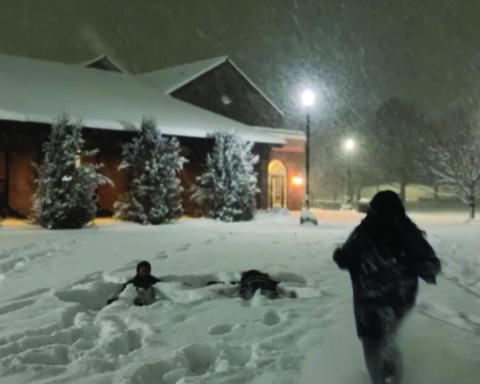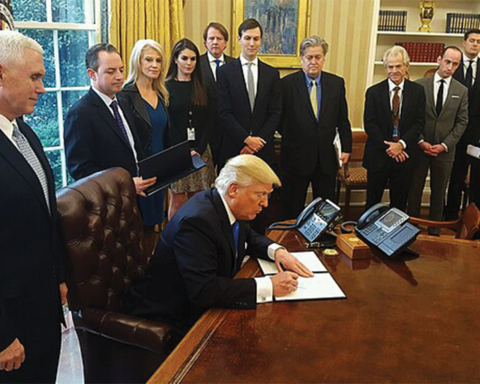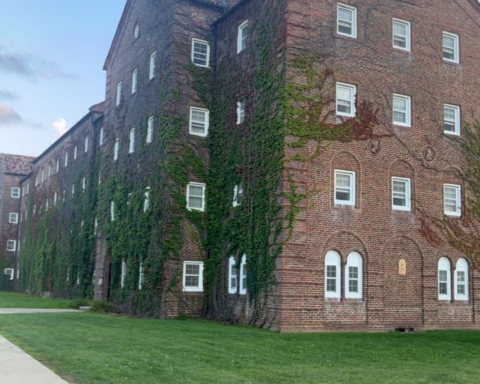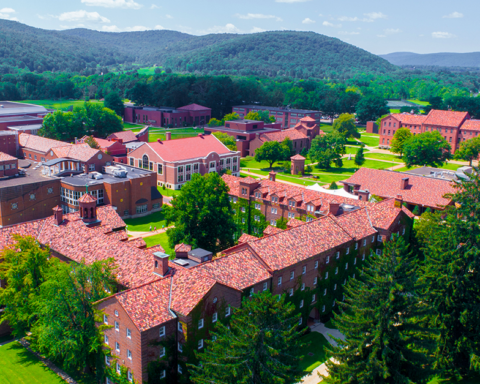By Kevin Rogers
Managing Editor
The media is feeding the American public with “myths” and ignoring or downplaying facts when it comes to coverage of the Syrian civil war, according to Ibrahim Zabad, assistant professor of political science at St. Bonaventure.
Zabad presented his research Monday night in Walsh Amphitheater as part of a panel discussion on Syria. The program, titled “Crisis in Syria: Beyond Chemical Weapons,” also featured a presentation from Helma de Vries-Jordan, assistant professor of political science at the University of Pittsburgh at Bradford, on the refugee crisis stemming from the country’s civil war. Clare College, the political science department and the international studies department sponsored the panel.
Zabad argued that while Syrian President Bashar al-Assad has been a brutal and corrupt dictator, the media has offered a one-sided, simplified account of the crisis, without accurately giving the Syrian rebels adequate blame for their own atrocities.
“There is a master narrative that has prevailed in Western media,” Zabad said, “This (crisis) is one of a war between good and evil.”
This narrative undermines the facts in the brutal civil war between the Assad regime and the more than 1,000 armed groups opposing it, according to Zabad. He addressed several prominent “myths” he found in media coverage of the atrocities. Prominent among these is the “myth” that the opposition has waged a peaceful revolution since the Arab Spring uprisings of 2011.
“The revolution did start in 2011 peacefully, but it quickly degenerated into brutal sectarian civil war,” Zabad said. “Before the armed resistance, we heard sectarian undertones in the revolution’s slogans.”
According to Zabad, some of the rhetoric of the early days of the revolution called for violence against Shiites, Alawites and Christians. Alawites are the sect of Shia Islam to which Assad belongs. One of the early slogans, translated into English, was “Alawites to the tombs, Christians to Beirut.”
Zabad also stressed that the Assad regime draws support from minority groups, including Christians and Kurds, challenging the “myth” of an Alawite-dominated regime. However, the opposition, made of Sunnis and varied Islamic fundamentalist groups, has targeted minority groups without specific military purpose. Zabad cited recent attacks on Christian and Alawite villages designed to “send a message” to the regime and described some of the most powerful factions of the opposition as “puritanical, reactionary and genocidal.”
Despite this, the media has portrayed the Assad regime as the only aggressor in the conflict. Zabad said the media estimate of 120,000 killed since the revolution began doesn’t properly differentiate between deaths caused by the regime and deaths caused by the opposition. However, the media tends to put the blame solely on the Assad regime, Zabad said.
“There’s no denying the fact that the Syrian regime has actually been engaged in atrocities, massacres and killed lots of civilians. Maybe the majority of the civilians have been killed at the hands of the regime,” Zabad said. “The more spectacular, more extravagant atrocities have been committed by the rebels, not the Syrian regime itself.”
In the remainder of his remarks, Zabad challenged the narrative that the regime would soon fall and that a peaceful reunification of Syria could occur.
“Syria is now de-facto partitioned,” Zabad said. “A cease-fire will be a formal recognition of this de-facto partition.”
De Vries-Jordan’s presentation focused on the refugee crisis stemming from the violence and how the international community ought to respond. Hundreds of thousands of Syrians have fled the country to Iraq, Egypt, Turkey, Jordan and Lebanon and registered as refugees. However, thousands more have not registered, giving the world a limited picture of the true size of the crisis, according to de Vries-Jordan.
“Many have crossed the border without registering because they’re afraid their family members may be targeted or that they might be targeted because they’re refugees,” she said. “The number counts that are out there are entirely off target. We’re talking about millions of people.”
A true crisis has erupted from this massive exodus for Syria, according to de Vries-Jordan. The nations hosting the refugees don’t have the resources to provide for the camps, and international organizations, including United Nations-linked groups, don’t have the funding to provide adequate standards of living including food, shelter, sanitation, medicine and education. This presents a heavy threat, as 50 percent of the refugees are children, she said.
“Syria has become the largest refugee crisis this year,” de Vries-Jordan said. “There’s been indicators that some of these refugees have been targeted for human trafficking and forced labor and international prostitution.”
The crisis has been exacerbated by a lack of funding, limited foreign assistance from the United States and waning support for refugees in the countries hosting them. To help counter these problems, de Vries-Jordan urged the audience to donate to one of the several organizations assisting refugees.
“This leaves you and me wondering what we can do to help,” she said. “We each have to make our decisions about what we’re going to do.”
Steve Melchiorre, a senior political science major, said he was impressed by Zabad’s presentation and his ability to expose little-known facts about the civil war.
“I thought Dr. Zabad did a terrific job,” Melchiorre said. “He hit all the necessary points I think an informed citizen needs to know in order to know what’s going on in Syria.”
He also said Zabad gave him new insights into the civil war he hadn’t considered, including the sectarian split in Syria and the level of support for the Assad regime.
“I didn’t realize that the revolutionaries weren’t backed by everyone,” Melchiorre said. “I thought it was a majority thing, but after the talk, I realized it was half and half, and even a little more in favor of the regime.”
Melchiorre said he opposed any U.S. military action in Syria and put up “dontattacksyria.com” posters up around campus last month. Though he acknowledged that Zabad was a tough act to follow, Melchiorre said de Vries-Jordan offered valuable insights into the humanitarian crisis.
“I felt a little bad because she had to go after Zabad, and it was a little difficult to hold everyone’s attention,” he said. “I think she got her points across and did a very nice job.”








